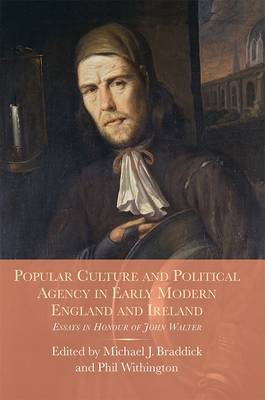
Vous voulez être sûr que vos cadeaux seront sous le sapin de Noël à temps? Nos magasins vous accueillent à bras ouverts. La plupart de nos magasins sont ouverts également les dimanches, vous pouvez vérifier les heures d'ouvertures sur notre site.
- Retrait gratuit dans votre magasin Club
- 7.000.000 titres dans notre catalogue
- Payer en toute sécurité
- Toujours un magasin près de chez vous
Vous voulez être sûr que vos cadeaux seront sous le sapin de Noël à temps? Nos magasins vous accueillent à bras ouverts. La plupart de nos magasins sont ouverts également les dimanches, vous pouvez vérifier les heures d'ouvertures sur notre site.
- Retrait gratuit dans votre magasin Club
- 7.000.0000 titres dans notre catalogue
- Payer en toute sécurité
- Toujours un magasin près de chez vous
Popular Culture and Political Agency in Early Modern England and Ireland
Essays in Honour of John Walter
209,45 €
+ 418 points
Description
An outstanding collection, bringing together some of the leading historians of this period with some of the field's rising stars, which examines key issues in popular politics, the negotiation of power, strategies of legitimation, and the languages of politics. One of the most notable currents in social, cultural and political historiography is the interrogation of the categories of 'elite' and 'popular' politics and their relationship to each other, as well as the exploration of why andhow different sorts of people engaged with politics and behaved politically. While such issues are timeless, they hold a special importance for a society experiencing rapid political and social change, like early modern England.No one has done more to define these agendas for early modern historians than John Walter. His work has been hugely influential, and at its heart has been the analysis of the political agency of ordinary people. The essays in thisvolume engage with the central issues of Walter's work, ranging across the politics of poverty, dearth and household, popular political consciousness and practice more broadly, and religion and politics during the English revolution. This outstanding collection, bringing together some of the leading historians of this period with some of the field's rising stars, will appeal to anyone interested in the social, cultural and political history of early modern England or issues of popular political consciousness and behaviour more generally. MICHAEL J. BRADDICK is professor of history at the University of Sheffield. PHIL WITHINGTON is professor of history at the Universityof Sheffield. CONTRIBUTORS: Michael J. Braddick, J. C. Davis, Amanda Flather, Steve Hindle, Mark Knights, John Morrill, Alexandra Shepard, Paul Slack, Richard M. Smith, Clodagh Tait, Keith Thomas, Phil Withington, Andy Wood, Keith Wrightson.
Spécifications
Parties prenantes
- Editeur:
Contenu
- Nombre de pages :
- 329
- Langue:
- Anglais
- Collection :
- Tome:
- n° 26
Caractéristiques
- EAN:
- 9781783271719
- Date de parution :
- 17-03-17
- Format:
- Livre relié
- Format numérique:
- Genaaid
- Dimensions :
- 156 mm x 234 mm
- Poids :
- 644 g






